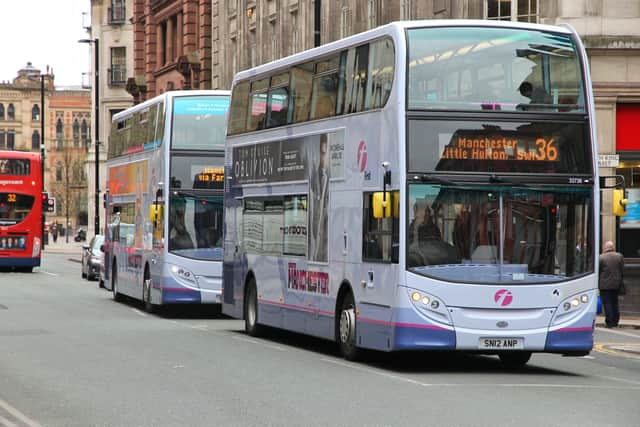Bus fare cap: when do £2 fares in England start, who is eligible for DfT discount, how long will it last?
and live on Freeview channel 276
Bus fares in England will be capped at £2 at the start of next year in an effort to help commuters struggling with the cost of living.
Prices for adult passengers will be frozen at £2 between January and March 2023 under a £60 million scheme confirmed by Transport Secretary Grant Shapps.
Advertisement
Hide AdAdvertisement
Hide AdThe Department for Transport said the cap could save travellers more than £3 on some single tickets and represented a 30% reduction on the average fare.
Mr Shapps said: “Buses are by far and away the most used form of public transport, so ensuring that almost all bus journeys are no more than £2 will assist passengers over the winter months and provide direct help to thousands of households across the country.


“This £60 million boost will mean everyone can affordably get to work, education, the shops and doctor’s appointments.
"We know people will be feeling the pressure of rising costs this winter, and so we have been working hard this summer to provide practical concrete help that will lower daily expenditure."
Advertisement
Hide AdAdvertisement
Hide AdThe scheme will see the DfT work with bus operating companies and local authorities to implement the cap. The DfT said that bus operators representing 90% of routes had expressed support for the temporary price cap and it was hopeful that the limit could be applied to all virtually all bus journeys in England.
According to the DfT, the average single fare for a three-mile journey is £2.80, so the cap will represent a 30% saving. However, in some rural areas, a single journey can cost up to £6. The cap will not affect fares already set below £2.
Cutting traffic and pollution
Paul Tuohy, chief executive of the Campaign for Better Transport, said: “This will be very welcome news for the millions of people who rely on the bus to get to work, to the shops, to medical appointments, and to connect with friends and family. It will also encourage more people to find their nearest bus stop and give the bus a try.
"Buses have great potential to cut traffic and carbon emissions, to connect communities and ease loneliness. This £2 fare cap - which we have called for - will help set buses on the road to a bright future.”
Advertisement
Hide AdAdvertisement
Hide AdAlison Edwards, policy director at the Confederation of Passenger Transport welcomed the “eye-catching initiative” but said it needed to have a long-lasting legacy. She commented: "We look forward to understanding in detail how the proposed fare cap will work in practice to ensure it supports the long-term sustainability of bus networks, which are vital in connecting communities with jobs, education and skills, as well as friends, family, and essential public services."
The England-wide price cap comes in the wake of local schemes also offering £2 fares, which have already come into effect.
From 4 September, bus passengers in Manchester and West Yorkshire will pay no more than £2 for a single journey, with transport operators in the Liverpool City Region introducing an identical cap from 18 September.
The Manchester scheme has been brought forward by 12 months and will see passengers save up to 50% on some tickets. When it was announced in August, Andy Burnham, Greater Manchester’s mayor, said: “The introduction of lower, simpler fares across our bus network signifies the biggest shake-up of our bus system in close to 40 years and comes at a critical time.
“Hundreds of thousands of households across Greater Manchester are deeply worried about money, with fears of even higher bills just around the corner.”
Comment Guidelines
National World encourages reader discussion on our stories. User feedback, insights and back-and-forth exchanges add a rich layer of context to reporting. Please review our Community Guidelines before commenting.
